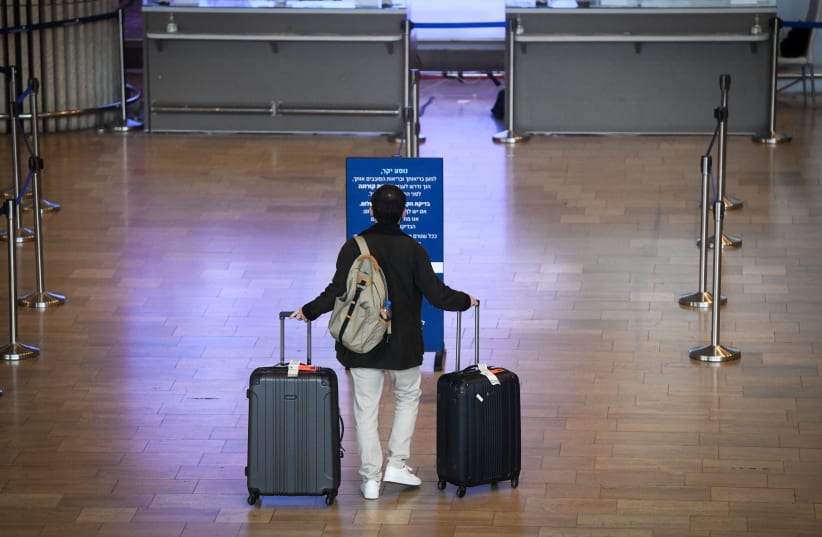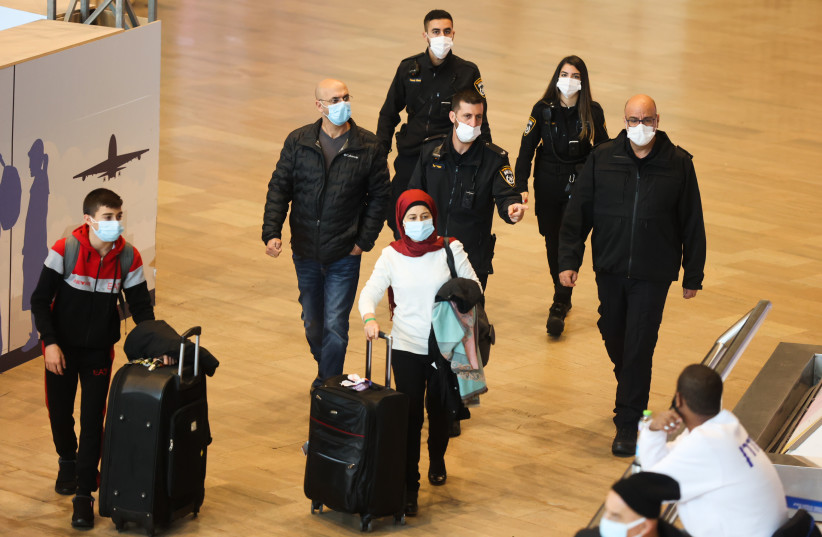Israel’s skies could open as soon as next week, according to Health Minister Nitzan Horowitz.
Speaking to KAN News, he said that “when we made the decision [to close the skies] in the beginning, the majority of Omicron cases were coming from abroad… Now, more and more of the infection is happening inside Israel.”
The current travel instructions, which include banning foreign entry into Israel and an extensive no-fly list to places with areas of high infection, are in place until Wednesday. The Knesset was supposed to have a discussion on whether or not to extend the restrictions on Sunday night but it was delayed.
שר הבריאות הורוביץ בריאיון ל-@MichalRabi: "ברגע שההדבקה מתפשטת, אין טעם לעצור את הכניסה מחו"ל. פתיחת השמיים לא תיקח הרבה זמן, ייתכן שבשבוע הבא. דנים גם בביטול הבידוד למחוסנים". על חיסון הילדים: "כל אחד צריך לשאול את עצמו למה הוא משאיר את ילדיו חשופים למחלה"#חדשותהערב pic.twitter.com/GO8wrLoRhb
— כאן חדשות (@kann_news) December 26, 2021
Horowitz said that he was not confident the restrictions would be lifted on Wednesday but “maybe in another week or something like that, but not too much longer from now.”
He made the comments on the same day as notes from last week’s meeting of the committee of experts advising the Health Ministry on the coronavirus pandemic were released, in which the experts suggested that Israel’s skies could reopen as soon as mid-January - if not before.
The committee, headed by Prof. Ran Balicer, met last week and reviewed a number of key restrictions, including those for Ben-Gurion Airport.
The country’s airport has been shuttered to foreigners since the first Omicron case was discovered in Israel last month. In addition, more than 50 countries are labeled “red,” meaning that Israelis cannot visit them without special permission.
“The Omicron morbidity rate in the community – in those who did not return from abroad and their direct contacts – is increasing,” the experts determined. “The continued existence of aviation restrictions is only relevant as long as there is no widespread infection from Omicron in the community.”
The team said the decision to close the skies was proven correct and bought Israel precious time to increase vaccinations, purchase potentially life-saving drugs and allow the economy to fully operate.
The children’s vaccination campaign, specifically, has increased in recent weeks. To date, 10% of children who turned five this year and 17% of children ages six to 11 have gotten the jab.
In addition, Israel has purchased thousands of doses of both Merck’s and Pfizer’s oral antiviral treatments, which are meant to stop infection from progressing to serious disease.
Pfizer’s antiviral pill Paxlovid, which received emergency-use authorization by the Health Ministry on Sunday, has been found to reduce hospitalization by 89%.
“In about a week, and at most two weeks,” widespread Omicron infection is expected in Israel, beyond the cases “imported from abroad,” the panel of experts said.
“We are rapidly approaching the point where this [airport] policy will no longer be beneficial due to a rapid increase in the local spread of the Omicron strain,” they said.
At that point, Israel could move to a system where vaccinated Israelis could travel in and out of the country as they pleased, but they would still require isolation for three days and two negative COVID PCR tests, the committee members said.
“Preparations should be made for the policy’s abolition,” they said.
Notes from the meeting were disseminated on Sunday.
The committee has no formal authority, and its recommendations have not always been accepted in the past.
On Sunday, the Knesset Constitution, Law and Justice Committee and its chairman, MK Gilad Kariv (Labor), held a discussion about allowing Israelis who work abroad to gain exceptions for travel, amid complaints by Yad L’Olim.
According to the NGO’s founder and director, former MK Dov Lipman, tens of thousands of people who are employed abroad now cannot get to work. This is especially the case for many new immigrants who maintain work abroad while building new lives in Israel.
With the United States, Canada, the United Kingdom and many other European countries labeled red, Israelis are banned from going there, and the exceptions form does not include an opportunity for people who work abroad to apply.
Kariv’s committee approved the new list of red countries last week but on Sunday said it expected the regulations for exiting the country to be altered before the end of this week to include this category of travelers.
“I want to thank MK Kariv for leading the way and hearing the voices of olim [immigrants],” Lipman said. “We have a long way to go to get the entry and exit rules to where they need to be, and Yad L’Olim will continue to fight for more leniencies, but today was a very important step in that process.”
If people were granted permission to travel to and from these red countries for employment, they would still be required to be isolated, according to the discussion in the committee.

